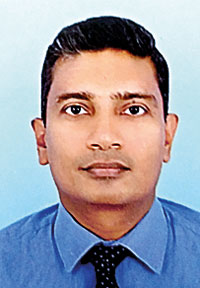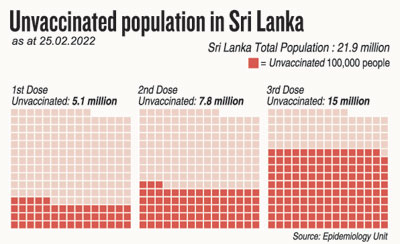News
‘After a COVID-19 infection, let your body guide you’

Dr. Eranga Narangoda
“Listen to what your body tells you. Even if the symptoms of COVID-19 have cleared and you have passed the seven-day stipulated period, do not jump back into your routine, if you feel unwell. Rest and be careful.”
This is the advice of Consultant Physician Dr. Eranga Narangoda of the Homagama Base Hospital who was attached to the National Institute of Infectious Diseases (NIID), Angoda, when the pandemic swept the world and
Sri Lanka. He has been treating COVID-19 patients from then up to now.
Peering at the variants, Dr. Narangoda says that Omicron which is spreading rapidly in
Sri Lanka now, has a shorter incubation period of about one or two days.
If someone has got exposed to a COVID-19 infected person (on Day 1), that person is likely to get the disease the very next day (Day 2) or Day 3.
This person would be infective (able to spread the disease to others), 2 days before symptoms appear and 4-5 days after symptoms appear.
If asymptomatic, it could be because of full vaccination. These people are less likely to spread the disease. They can go to work or get about their routine but scrupulously keep to health measures like everyone else – face-mask wearing; hand hygiene, social distancing, avoiding crowded places and avoiding enclosed places.
The current health guidelines are:
The quarantine period for people who are symptomatic is 7 days, if fully vaccinated. This means that if their symptoms have cleared, they can go back to their routines in 7 days. There is no need to take an RT-PCR after recovery. Earlier, during the spread of the other variants, the quarantine period was 14 days.
If not fully vaccinated, the isolation period is as before – 14 days.
“It is obvious that the disease is spreading very fast. An exposure of a half-day will be followed by symptoms showing up very quickly, whereas exposure to the original virus earlier took about 4-5 days for symptoms to come about. People are falling victim tak gala,” says Dr. Narangoda, stressing that even before these patients know they are infected, they have spread it before they can isolate themselves.
Earlier, before Omicron, when other variants were going around, the isolation period was 10-14 days as the infected people were infective up to then. However, with Omicron, the infective period is around 7 days, he says, quoting studies carried out in the United Kingdom.
He points out that once the symptoms resolve, the chances of that person spreading the illness reduce drastically.
In a majority of the patients, Dr. Narangoda has seen the following symptoms in this Omicron wave:
Headache
The throat being affected – ranging from mild irritation to severe soreness
The above symptoms can be with or without fever
A dry cough
He says that a majority of the Omicron patients are not showing signs of breathing difficulty, hypoxia or pneumonia. These risks seem to be less, mostly because many people are fully vaccinated. The infective period being less is also because of this factor – vaccination.
Referring to patients who are admitted to hospital, this Physician says that they are discharged 7 days from the onset of symptoms and after being fever-free for 48 hours or more. If a person is self-isolating at home, if fully vaccinated and symptom-free, he/she can go back to work after 7 days.
“Let your body guide you. Let it tell you whether you should go back or not. If you feel unfit, stay home a few more days,” he says, pointing out that some people who have rushed back to work on the dot after 7 days have had trouble. People must take a “good” rest. They have noticed this among healthcare workers too who come back soon after the stipulated 7 days but cannot work.
Dr. Narangoda adds that these symptomatic people who have rushed back to work sometimes continue to get symptoms after a while (1 or 2 weeks later) or get Long-COVID.
| Addressing concerns of patients If you are having fever and upper respiratory symptoms (stuffy nose, runny nose, a dry cough, etc.), think it is COVID-19, says Dr. Eranga Narangoda, explaining that if you are fully vaccinated and the symptoms are mild, testing is not mandatory. His advice: isolate yourself, rest, eat nutritious food and drink plenty of fluids. An oft-asked question by those infected with COVID-19 is when they should take the booster, he says, adding that if they have taken 2 doses (1st and 2nd) and then got the infection, the Pfizer booster can be taken about 5-6 months later. | |
The best way to say that you found the home of your dreams is by finding it on Hitad.lk. We have listings for apartments for sale or rent in Sri Lanka, no matter what locale you're looking for! Whether you live in Colombo, Galle, Kandy, Matara, Jaffna and more - we've got them all!

